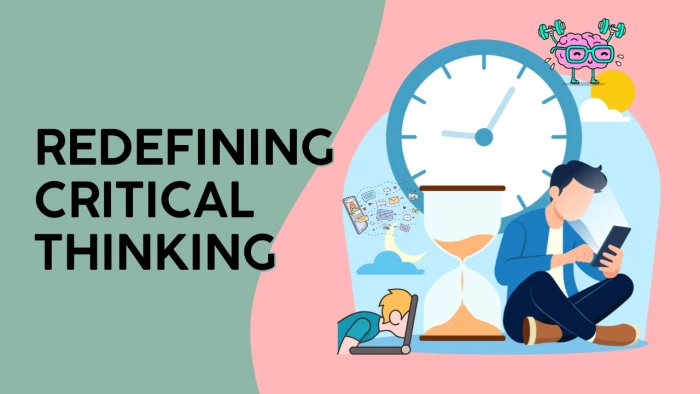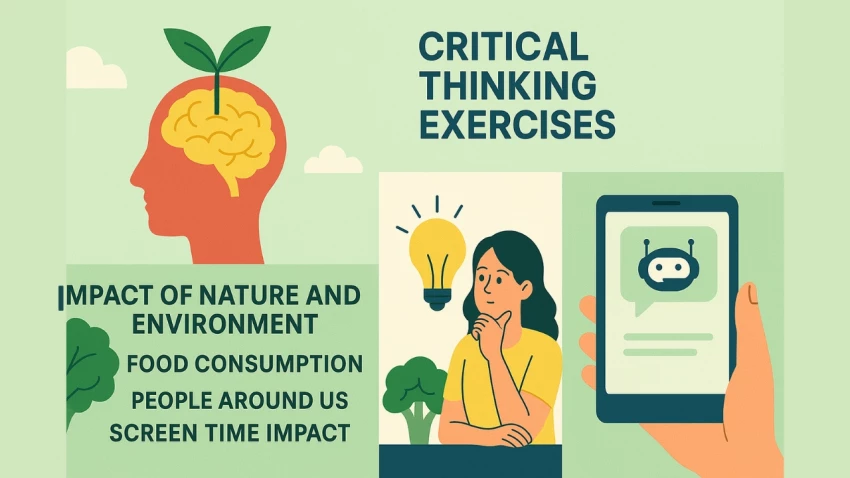

We live in a time where information is abundant, yet clarity is rare. With just a swipe, we’re exposed to more news, opinions, and distractions than past generations saw in weeks. The result? Our minds are overstimulated but undertrained. Critical thinking—our ability to question, analyze, and reason—has never been more important.
But critical thinking doesn’t exist in a vacuum. It’s shaped by our routines, environment, relationships, and even the food we eat. And in a world where AI and digital screens dominate, we need to be intentional about mental growth.
This article explores how to develop a healthy, sharp mind by weaving together critical thinking exercises, lifestyle choices, environment, nutrition, screen habits, and the role of AI.
At its heart, critical thinking is the process of making reasoned judgments. It’s about distinguishing fact from opinion, identifying biases, and asking better questions. According to the American Philosophical Association, critical thinking includes skills like interpretation, analysis, evaluation, inference, and self-regulation.
In short, if we don’t strengthen this skill, we risk being led instead of leading.
In Finland, schools integrate “phenomenon-based learning,” where students explore real-world problems through critical inquiry rather than memorization. The result? Finland consistently ranks in the top tier for problem-solving skills on the OECD’s PISA assessments.
Sleep is the brain’s reset button. Research from the National Sleep Foundation shows that sleeping fewer than 7 hours impairs working memory and attention by up to 40%.
Aerobic exercise increases BDNF (Brain-Derived Neurotrophic Factor), which enhances learning and memory. Just 20 minutes of brisk walking can elevate focus for the rest of the day.
Adopt the “2-for-1 rule”: For every 2 hours of passive use, spend 1 hour on activities that build skills—whether it’s writing, learning a language, or structured debate.

Much like calculators reduced our ability to perform mental math, constant reliance on AI can weaken independent reasoning. The solution? Use AI as a partner, not a substitute.
Time outdoors isn’t just refreshing—it rewires the brain. A Stanford study found that 90 minutes in nature reduced rumination, a risk factor for depression.
Humans are wired for interaction. Conversations force us to listen, interpret, and respond—core elements of critical thinking.
Research from Harvard’s Study of Adult Development shows that strong social ties are the most reliable predictor of long-term happiness and cognitive resilience.
Tip: Cultivate relationships that challenge you to think deeper, not just agree with you.
A developing mind doesn’t thrive on one element alone—it needs the right mix of food, sleep, environment, relationships, and purposeful thinking habits. Add mindful use of screens and AI, and you create the conditions for real growth.
The question isn’t whether technology will shape our minds—it already does. The real question is: Are we letting it shape us passively, or are we actively shaping ourselves alongside it?
Your brain is your most valuable asset. Train it daily, feed it well, give it rest, surround it with the right people, and let nature recalibrate it. Critical thinking is the compass that helps you navigate all of this—so exercise it like a muscle, and it will serve you for life.
Be the first to post comment!